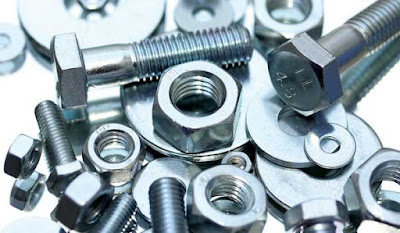Different types of commonly used material for nuts and bolts.
Be it
construction or any other major industry the role of nuts & bolts &
other types of fasteners are critical. Thus, they determine the overall
strength & structure of the largest structures.
In case if you happen to have your business in the manufacturing
or construction sector, we are sure that you would like to know what the
commonly used materials for nuts & bolts by fasteners
manufacturer in United States. So, let us take a look at the different
types of materials used.
The different types of fastener materials used
Fasteners are made with a different variety of materials.
These include everything from common steel to titanium, plastic & other materials.
Some of these materials are again classified into different grades. This is
done to describe some alloy mixtures, hardening as well as different processes
involved.
Apart from this some nuts & bolts are available with a
variety of coatings and platings. This is done to increase the
resistance against corrosion and change the appearance of the fastener.
Fastener material is very much
important when choosing a fastener due to keeping in view the strength,
brittleness, corrosion resistance, galvanic corrosion properties. Cost of-course is an important factor which determines which materials to choose. Let
we now see fasteners material in details from fasteners
exporter in United States.
Steel
Steel is the most common material used for
making nuts & bolts & fastener material. These are available plain.
They are also available with various surface treatments. These may include such
as zinc plating, galvanization, & chrome plating.
The grade of steel to
be used may differ largely based on your different needs. They are usually
available in 4 standard grades.
Alloy Steel
Alloy
steel bolts are made from a high strength steel alloy. They are
further heat-treated to make them stronger. These are mainly not plated,
resulting in a dull black finish. These types of bolts are very strong. Nut
they are very brittle at the same time.
Silicon Bronze
Silicon bronze often referred to simply as
bronze. This is an alloy made mostly from a mix of copper & tin. They also
contain small amount of silicon. These are mainly in marine
environments. It is often preferred to have silicon bronze over stainless in
wooden boat construction. To know more about other material visit fasteners
supplier in United States.
Brass
Brass is an alloy that is primarily made
from a mix of copper & zinc. This alloy happens to be highly corrosion-resistant.
It is also electrically conductive. But this is usually not used in fasteners
because of its relative softness.
Aluminum
Aluminum happens to be a light, soft, and
a corrosion-resistant metal. Material like stainless steel, aluminum is known
to be very corrosion resistant. Fasteners are made from different
types of aluminum alloys. These can be with different elements such as
manganese, silicon, iron, magnesium, zinc, copper, etc. Rivets are often made
from aluminum alloys.
Chrome
Nuts & bolts & other fasteners are
often chrome plated & polished. This is mainly for appearance. Chrome
plating provides corrosion resistance. But this is very costly & thus
not very popular. If you want to buy fasteners of different materials
visit fasteners
dealers in United States.




Actually I read some of your post and then became very eager to know more about you and it's really interesting to find that you are going great. Keep it up. Everyone can get good information on Stainless Steel Fasteners
ReplyDeleteWow what a great blog, i really enjoyed reading this, good luck in your work you can also visit my blog at Cold Formed
ReplyDeleteit is an informative piece of guidance Provided by you. Very glad to find this information here and I am sure that it is beneficial for Everyone. Please also take a look at 310/310S Stainless Steel Band Supplier.
ReplyDelete
ReplyDeleteHigh quality product's
visit once :
Pop Rivet Nuts |
Rivnut |
Stainless Rivet Nut |
Steel Rivet Nuts |
Aluminum Rivnuts